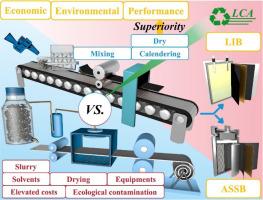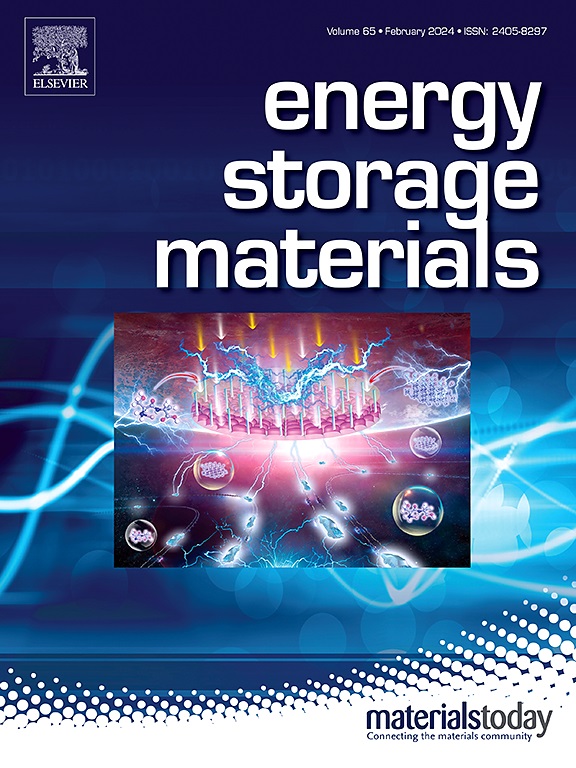Green and Economically Viable Dry-Electrode Manufacturing for High-Energy-Density Lithium Batteries
IF 20.2
1区 材料科学
Q1 CHEMISTRY, PHYSICAL
引用次数: 0
Abstract
The global transition to electrification is driving the demand for lithium-ion batteries (LIBs) with higher energy density, lower cost, and reduced environmental footprint. Conventional slurry-based electrode manufacturing, which relies on toxic solvents and energy-intensive drying processes, poses significant economic and environmental challenges. Solvent-free dry electrode technology has emerged as a transformative alternative to overcome these limitations. This review provides a comprehensive and critical analysis of the dry process from three pivotal perspectives: economic advantages, environmental benefits, and performance superiority, conducting a multidimensional comparative analysis with slurry-process electrode manufacturing. The scientific principles behind these advantages are elucidated through microstructural and electrochemical characterization. Meanwhile, comparative life cycle assessment (LCA) data are employed to demonstrate the significant advantages of dry electrodes in terms of energy consumption and carbon emissions. Regarding application potential, leveraging Tesla's successful industrial application case, we explore the broad prospects of dry electrodes in LIBs, solid-state batteries, and other domains. Finally, in the context of the rapidly advancing dry electrode technology, we highlight the severe challenges that remain before truly achieving industrial-scale application. This work offers a holistic theoretical foundation and practical guidance for adopting dry electrode technology as a core strategy for sustainable battery manufacturing.

绿色和经济可行的高能量密度锂电池干电极制造
全球向电气化的过渡推动了对锂离子电池(lib)的需求,这些电池具有更高的能量密度、更低的成本和更少的环境足迹。传统的基于浆料的电极制造,依赖于有毒溶剂和能源密集型干燥过程,带来了重大的经济和环境挑战。无溶剂干电极技术已成为克服这些限制的变革性替代方案。本文从经济优势、环境效益和性能优势三个关键角度对干法工艺进行了全面和批判性的分析,并与浆料法电极制造进行了多维度的比较分析。通过微观结构和电化学表征阐明了这些优点背后的科学原理。同时,利用比较生命周期评估(LCA)数据证明了干电极在能耗和碳排放方面的显著优势。在应用潜力方面,利用特斯拉成功的工业应用案例,探讨干电极在锂离子电池、固态电池等领域的广阔前景。最后,在快速发展的干电极技术的背景下,我们强调了在真正实现工业规模应用之前仍然存在的严峻挑战。该研究为采用干电极技术作为可持续电池制造的核心策略提供了全面的理论基础和实践指导。
本文章由计算机程序翻译,如有差异,请以英文原文为准。
求助全文
约1分钟内获得全文
求助全文
来源期刊

Energy Storage Materials
Materials Science-General Materials Science
CiteScore
33.00
自引率
5.90%
发文量
652
审稿时长
27 days
期刊介绍:
Energy Storage Materials is a global interdisciplinary journal dedicated to sharing scientific and technological advancements in materials and devices for advanced energy storage and related energy conversion, such as in metal-O2 batteries. The journal features comprehensive research articles, including full papers and short communications, as well as authoritative feature articles and reviews by leading experts in the field.
Energy Storage Materials covers a wide range of topics, including the synthesis, fabrication, structure, properties, performance, and technological applications of energy storage materials. Additionally, the journal explores strategies, policies, and developments in the field of energy storage materials and devices for sustainable energy.
Published papers are selected based on their scientific and technological significance, their ability to provide valuable new knowledge, and their relevance to the international research community.
 求助内容:
求助内容: 应助结果提醒方式:
应助结果提醒方式:


